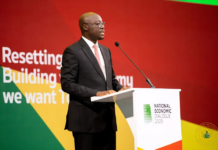
It was last May that the BBC unveiled an ambitious plan to give a million schoolchildren a tiny device designed to inspire them to get coding. Now, after a few bumps in the road, the Micro Bits are finally ending up in the hands of children.
The tiny device can be plugged into a computer and programmed to do all sorts of cool stuff, and Year Seven pupils across the UK are being told it is theirs to take home.
Some, who have had early access to the Micro Bit, have come up with amazing projects – like the Yorkshire school that sent one up 32km (20 miles) on a balloon bringing back pictures of its journey to the fringes of space.
But amid all the excitement from the young people getting a new toy, this is where the serious stuff starts. Big claims have been made for how this project can change the way children learn about and engage with technology. Now, it’s up to teachers to make that happen.
I’ve been talking to two people with different perspectives on the Micro Bit. Steve Hodges is a Microsoft engineer who was closely involved in the design of the device and Drew Buddie is head of computing at a girls’ school and chairman of NAACE, an educational technology association.
Steve told me that his whole career in computing had started as a result of the BBC Micro in the 1980s.
“I begged my parents to buy me one for home. I told them I would never ask for anything again if they bought me a BBC Micro!” he recalls.
His hope is that the Micro Bit will prove similarly inspiring.
Unlike his generation, today’s children already have access to a variety of computers, so the aims are different.
“We built a small, low-power ’embedded’ device, which actually needs a regular computer to program it. In a world of wearable devices, connected gadgets and the ‘internet of things’ the Micro Bit is both relevant and yet unusual – just like the BBC Micro was 35 years ago,” he says.
Drew is very enthusiastic about the aims of the Micro Bit, and he too harks back to his childhood.
“For those of us who were around for the BBC Micro, we feel that we are on the very cusp of a renaissance of that era,” he says.
But the repeated delays in rolling out the device to schools have dismayed him.
Teachers have had Micro Bits for some weeks but they are being delivered to children just as the term ends.
“There seems to be a perception at the BBC that teachers were ready to drop everything to use these devices as soon as they became available,” Drew says. He explains that it’s now too late in the year for many to adapt their lesson plans.



























